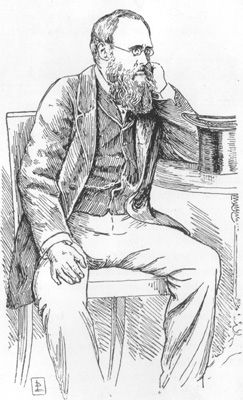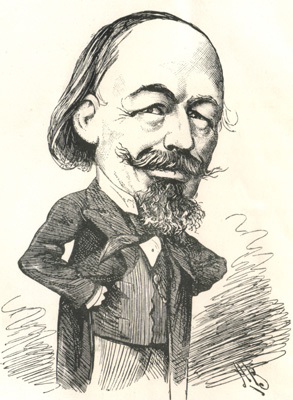1905
Twenty Years Ago
|
 
|
| Edmund Downey worked with the publisher William Tinsley from
1879 to 1884. This short anecdote refers to seeing Wilkie sometime in those
five years and Tinsley's account of negotiations for The Moonstone.
As Downey recognises, it differs from Tinsley's own account in
Random Recollections. There is
a sketch of Collins by Downey's brother Thomas which is based on a
photograph by Elliott & Fry taken around 1871. . The sketch of Tinsley on
the right is by Alfred Bryan (1852-1899). |
.A PEEP AT THE AUTHOR OF “ THE WOMAN IN WHITE.
I was with my chief one afternoon
in his cosy corner at the Gaiety bar when he suddenly sprang up and walked
towards a small marble-topped table at which was seated a plump, spectacled man,
wearing something of a country-squireish air. He spoke to this man for some time
and then he returned to me.
“The face of your friend seems
somehow familiar, and yet I don’t think I ever saw him in the flesh before,”
said I.
“That’s old Wilkie Collins,” said
Mr. Tinsley. “There he goes!” as “old Wilkie” rose and nodded a good-bye to the
publisher. I was thrilled with excitement at beholding the author of “The Woman
in White.” Mr. Tinsley guffawed when I revealed to him my awe-inspired feelings
concerning Wilkie Collins.
“My boy,” said he, “you’d be much
more awed if you had to negotiate a book with him. He’s as shrewd as they make
’em. Tell you about my dealings with him. When he started ‘The Moonstone’ in
All the Year Round, I told Charley Dickens I’d be glad to publish it. I
never had any dealings with Dickens himself—he was bound up with the Chapmans—but
he spoke to Wilkie about the ‘Moonstone’ and we arranged the deal. As you know,
I was never in the habit of fixing up long-winded agreements.* A simple exchange
of letters was our usual style. But, in the case of ‘The Moonstone,’ Wilkie’s
solicitors sent in a draft which was a regular corker ; it would pretty well
cover the gable of an
ordinary-sized house.
*“With this excellent man,” writes Mr. Percy Fitzgerald (in his
“Recreations of a Literary Man”) “—and we have had innumerable transactions—I
never had a scrap of writing in the shape of an agreement. His word and my word
were sufficient and made the bond.”
I was to pay so much down for so
many copies in three volumes, and so much for every further two hundred and
fifty copies. I did fairly well with the book—but nothing to shout about in
those days. When I considered that the sale was over, or nearly over, in
three-volume form, Master Wilkie thought I ought to venture on another edition,
paying him, of course, in advance and on the original terms. The thing looked
too risky, but I offered to do it if the terms were reduced, explaining my views
and showing that if I paid on the whole edition and had anything like a large
surplus of unsold copies that I’d lose money. Master Wilkie cried off and said
he’d do the book elsewhere. This was his affair, so I said no more.
“Shortly afterwards, the printer of
the book said to me: ‘I suppose you don’t want the type of “The Moonstone” any
longer?’ ‘No,’ said I, ‘you can break it up.’ And then a thought flashed across
me. ‘Hold hard!’ said I. ‘Have you been hearing from anybody in connection with
the type of “The Moonstone?” The printer was obliged to admit that he had. ‘And
you want to use my type and save someone else from setting up the book again. No
you don’t, my friend,’ said I. ‘I’ll keep my eyes open for the next edition of
“The Moonstone,” and if it’s my type you can look out for squalls.’ A few days
later Master Wilkie’s people informed me that they would accept my terms for a
new edition of ‘The Moonstone.’ They were pretty sharp, I think, but I was just
as wide awake. Same time, the little breeze cost me the loss of further business
with Master Wilkie. Just my luck!*
* In his “ Recollections,” William Tinsley gives a version of his
dealings with Wilkie Collins which differs in some respects from what I have set
down here. I can only say I am faithfully reporting his version of this
particular transaction as he told it to me.
BUSINESS MAXIMS.
I will conclude this chapter by
stating that Tinsley had two business maxims which, when I first heard them
propounded, startled me. One was that one’s Bankers’ Pass-Book was the surest
and truest guide to one’s financial position. The other was that “Letters answer
themselves.” I had been taught to believe that business letters should
invariably be attended to upon the day they were received. When I would consult
Mr. Tinsley about the nature of a reply to a “difficult” letter, he would take
it from me and put it into a “pigeon-hole” which crowned his desk. “ That’s
answered, my boy,” he would say, with a smile. “Don’t you worry!”
From Twenty Years Ago by Edmund Downey, London 1905 pp23-27.
go back to biographies list
go back to Wilkie Collins front page
visit the Paul Lewis front page
All material on these pages is © Paul Lewis 1997-2006

